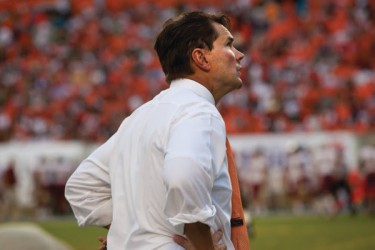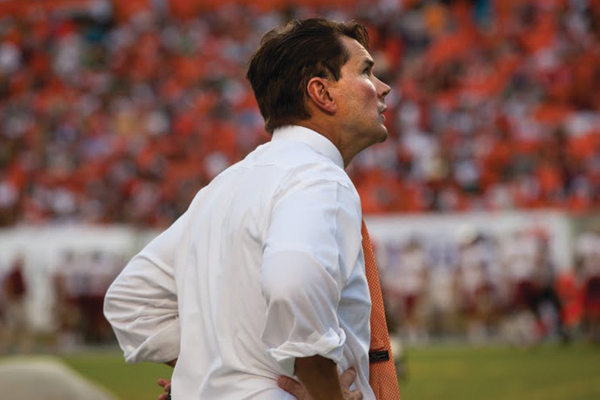
Never has a 6-6 season been so memorable, yet so ill-fitting. Miami football has been memorable in the past, but this year could be remembered for all the wrong reasons.
A totally mediocre season will hang ominously over the fact that all of the Canes’ losses combined for a deficit of 33 points, and that each game lost contained opportunities in the waning moments for the result to go Miami’s way.
Open season on the Hurricanes started well before kickoff in Maryland. Yahoo! Sports’ August expose` with allegations that Nevin Shapiro provided improper benefits to Miami athletes became national news fodder for weeks, shrouding in scrutiny what was supposed to be new head coach Al Golden’s christening as the program’s would-be savior.
For the current players linked to the Shapiro reports – 11 players initially, though only eight received suspensions – handling the media sometimes meant keeping them in the dark. Insulating themselves from the outside may have strengthened their bonds internally, and the Canes almost took on an “us against the world” mentality.
Senior quarterback Jacory Harris, willingly or not, became the symbol for what the program accomplished. Poor play from the defense or special teams gaffes always found their way back to Harris in the public’s eye.
The position he played had as much to do with the scrutiny he was under as did the manner in which he carried himself. Harris never backed away when he had to take the blame (even when it was wrongfully placed upon him) and he made sure to state that opinions floating outside the locker room were of no importance to him.
After returning from his one-game suspension, Harris made better decisions, protected the ball and continued to be the vocal leader and figurehead of his team for media and fans alike.
This past year was by far his most productive in terms of statistics and, short of his final performance against Boston College, served to silence the critics that worried he would forever be a turnover machine and constant source of frustration.
But his renaissance of a senior year was not enough to change the booing home crowd’s mind. The stain was there, and fans had made up their minds to move on and look ahead to a new quarterback and a new era.
The 2008 recruiting class was thought to be a batch of talented home-grown players set to return Miami to its past successes. It did not turn out that way.
Instead, Harris and company were inconsistent and did not perform to the lofty expectations thrust upon them as 18 year-olds.
And as most of the 2008 class leaves Coral Gables, so too does the image of former head coach Randy Shannon.Though his players will still fill the majority of the roster for the next two seasons, enough time has passed to start believing the program now fully belongs to Al Golden and his staff.
Securing Golden through February 2020, at least on paper, gives the Hurricanes the chance to promise security to recruits, ensuring them that the new patriarch won’t be skipping town anytime soon.
That notion was far from certain throughout the season, but the Penn State sex-abuse scandal may have surpassed Miami’s ordeal in terms of less-appealing NCAA sanctions still to come. And by self-imposing a bowl ban for this season, the rebuilding process has begun.
Golden and others have stated their beliefs that the worst of the investigation is behind them, though the final rulings have yet to be determined. More bowl bans are surely on their way, with possible scholarship reductions and an extended period of probation to follow. Conjecture is all that exists at this point, but the rebuilding process could not begin without Miami taking action itself. The 2011 season will not be remembered for a 6-6 record. Too many nuances and side stories became headlines, too much has come from the field’s periphery to make wins and losses the abject importance. Rather, 2011 will be the year Miami lost to the outside despite its best intentions to keep things in house.
There’s no easy way to define a calamity that isn’t quite over. What punishments lie in wait from the NCAA may make the August media circus full of “death penalty” talk look like an improper lynching. Or maybe the steps Miami has already taken will seem quaint in comparison to what an organization looking to reassert its power has in store.
But for Golden, the University of Miami and everyone else who is ready to turn the page, the future can’t come soon enough.






